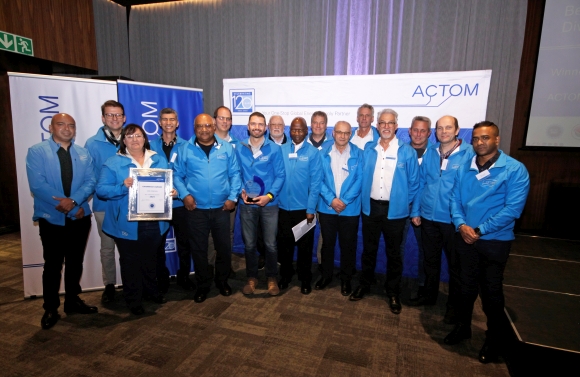ACTOM’s top management team who administer and judge the annual Chairman’s Award have revamped the criteria by which the performances of the group’s divisions during the year under review are assessed for the competition.
The changes are aimed at making the results of the contest more meaningful and effective and competition between the divisions keener than ever before.

Under the new set of rules that came into effect for the first time in the latest competition for the financial year to end-March 2024, John Thompson came through again as winner of the highly sought-after Chairman’s Award for the third successive year in a neck-and-neck race with its closest rival Marthinusen & Coutts, which took the Runner-Up prize.
Of the original set of criteria for the competition’s main divisional portion, applied since the launch of the Chairman’s Award in 2012, five remain unchanged, while three enhanced criteria have been introduced and one entirely new one added.
In the list below of the criteria now applicable in the competition’s divisional section – where the financial criteria, as always, play a dominant role over the non-financial criteria in the scoring – each criterion is categorised in brackets as “financial” or “non-financial”, followed immediately within a second set of brackets by the points scored for each criterion by John Thompson on its well-balanced scorecard.
The unchanged criteria are:
- EBIT Growth (financial) (19.0)
- Export Orders Growth (financial) (6.5)
- Export Sales Growth (financial) (8.0)
- IT Audit (non-financial) (4.5)
- LTIFR (non-financial) (4.5)
- The enhanced ones are:
- EBIT Compound Growth over 3 years (financial) (8.5)
- Free Cash Flow excluding Capex as % of EBIT (financial) (17,0)
- B-BBEE score (non-financial) (9,5)
- The brand-new one is:
- Economic Value-Add (EVA) Growth (financial) (9,0)
In addition, four divisions, namely Electrical Equipment, MV Switchgear, ACTOM Turbo Machines and Engineering Projects & Contracts were awarded Divisional Certificates of Excellence.
In the business units section, which is treated as secondary to the competition’s divisional section and is therefore subject to a simpler set of rules, four business units, namely: Transport, Protection & Control, Electrical Products and ACTOM Energy were presented with Business Unit Certificates of Excellence.
Finally, the prize for the best semi-technical article published in What’s Watt during the period under review went to Dr Brad Rawlins, Design Engineer of John Thompson’s Industrial Watertube Boiler business unit, for the article “Modelling power Islands using simulator & design software for biomass plants” published in the December 2023 issue of the magazine.
The Chairman’s Award presentations were made at ACTOM’s Annual Review function in Johannesburg on June 7.
Discussing the changes to the divisional competition criteria that are now in force, Group Chairman Andries Mthethwa said the rationale behind the introduction of the new Economic Value-Add (EVA) Growth criterion that has been introduced can perhaps be best illustrated by the following negative example.
“A business discovers that the final independent test on the latest product it has developed has failed. What does this mean? It represents a comprehensive failure by the business management encompassing a combination of bad planning, bad supervision and bad workmanship. Not only have you wasted a lot of money in having a final test fail, but you are now obliged to go through the whole process again, at the expenditure of more money, to get it right and have the product re-tested, which would’ve been avoided if you’d done it right the first time.
“EVA in short means ensuring that you make a profit.”
The introduction of the new “EBIT Compound Growth over 3 years” criterion, coming on top of the existing key EBIT Growth criterion, is aimed at encouraging businesses to maintain EBIT Growth continuously. Similarly, “Free Cash Flow excluding Capex as % of EBIT” replaces the former “Free Cash Flow” criterion to reflect a true picture of a business’s operational cash flow in a given year, while at the same time encouraging necessary periodic capital expenditure to ensure that it keeps pace with important technological advances in the industry in which it operates.
Up until now the B-BBEE criterion has been relatively static in terms of encouraging further improvements in ACTOM’s B-BBEE contributions and record. By shifting the focus from simply maintaining the group’s B-BBEE rating at its current Level to setting up a scoring system to reflect improvements in B-BBEE performance, in terms of actual points scored, by each of the divisions year-by-year makes the system both more dynamic and boosts the aggregate B-BBEE performance of the group as a whole.
